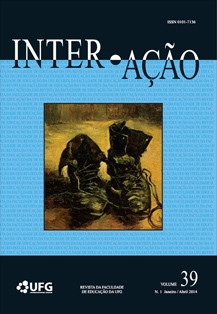FORMAÇÃO SUPERIOR EM DANÇA NO BRASIL: PANORAMA HISTÓRICO-CRÍTICO DA CONSTITUIÇÃO DE UM CAMPO DE SABER
DOI:
https://doi.org/10.5216/ia.v39i1.26443Keywords:
ensino da arte, dança, formação superior, epistemologia.Abstract
Este artigo apresenta um panorama histórico-crítico da constituição da dança como um campo de saber acadêmico no Brasil. Analisa as injunções entre arte, história e educação na formação superior em dança no país. Trata-se de uma pesquisa documental e bibliográfica.
Title: Academic Training/Teaching in Dance in Brazil: overview of a field of knowledge
Abstract: The following article presents an overview of constitution of dance as a field of academic knowledge in Brazil, from a historical and critical point of view. Analyzes the relationship between art, history and education in the education of dance in Brazil. It consists in a documental and bibliographical research.
Keywords: art education, dance, higher education, epistemology
Downloads
Downloads
Published
How to Cite
Issue
Section
License
Inter-Ação uses the Creative Commons Attribution 4.0 License for Open Access Journals (Open Archives Initiative - OAI) as the basis for the transfer of rights. Open access means making documents available on the Internet free of charge, so that users can read, download, copy, distribute, print, search, or link to the full text of documents, process them for indexing, use them as input data for software programs, or use them for any other lawful purpose, without financial, legal, or technical barriers.
Authors publishing in this journal agree to the following conditions:
1) Authors retain copyright and grant the journal the right of first publication, with the work simultaneously licensed under the Creative Commons Attribution License, which permits redistribution of the work with attribution and first publication in this journal.
2) Authors are permitted to enter into additional, separate agreements for non-exclusive distribution of the version of the work published in this journal (e.g., for publication in an institutional repository or as a book chapter), with attribution and first publication in this journal.
3) Authors are permitted and encouraged to publish and distribute their work online (e.g. in institutional repositories or on their home page) at any time before or during the editorial process, as this may generate productive changes as well as increase the impact and citation of the published work.















